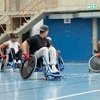10 tips for exam preparation
16 October 2019 | Story Sarah Middleton. Photo Je’nine May. Read time 4 min.
As consolidation week kicks off today, students are encouraged to ensure they are preparing for the upcoming exams in the most efficient way.
Read the tips below to see if you are on the right track.
1. Get enough sleep
Staying up late to cram for exams is probably the worst thing you can do. Sleep builds memory, so ensure you get plenty of sleep in the next crucial weeks, and seven to eight hours the night before an exam to optimise alertness.
2. Organise your study space
Choose a place to study that is comfortable and free of distractions and clutter. Don’t study in bed and, most importantly, put your cellphone away. Log out of all social media sites and don’t be tempted to check your email. The Hlanganani study area in the University of Cape Town (UCT) Library is open 24/7 and also provides group study rooms.
3. Organise study groups
Working in a group can be very effective. You can gain insights from each other and run ideas past your classmates. Also, if you don’t know an answer, someone else is likely to know it.
4. Explain concepts to others
Take turns to explain difficult concepts to each other. If you can explain it, you probably know and understand it.
5. Practise on past exam papers
Past exam papers are available electronically on Vula. Click on “My Active Sites” to find the Electronic Exam Papers page. It differs according to faculty, but the earliest papers are from June 2004. Replicate exam conditions when you attempt the past papers and mark yourself strictly.
6. Take regular breaks and get some exercise
Take a break of five to 15 minutes at least every 90 minutes, depending on how long you’ve been studying for. A little exercise is better than none, even if it’s just walking from middle campus to upper campus rather than taking the Jammie Shuttle. You’ll get extra oxygen to your brain and come back sharper and more energised.
7. Snack on healthy food
Take care of your body and mind by eating healthy food. Eating more fish, walnuts and dark chocolate, and drinking green tea, is great for boosting brain function. Avoid sugary foods as these will cause an energy slump after the initial boost.
8. Plan your exam day
Confirm your exam venue and time so that you wake up knowing exactly where to go, and when. Be sure to drink some water and have something to eat, and take extra pens and pencils with you. Dress warmly – the large exam venues can get chilly, even on a warm day.
9. Take deep breaths
Twenty minutes of meditation in the morning is very beneficial for anxiety, but if you don’t have time to do this just take five minutes at the start of your day to focus on your breathing. This can also help sharpen your focus right before the exam, as breathing deeply increases the oxygen flow to your brain.
10. Read through the exam paper
The time pressure of an exam situation makes it tempting to start writing immediately. However, by taking a few minutes to read through the paper you are giving yourself a great advantage. Your mind will begin to process what you are reading and you can plan your time much more effectively if you know what to expect.
Above all, remember that the earlier you start your revision, the less anxiety and stress you are likely to feel.
Happy studying!
 This work is licensed under a Creative Commons Attribution-NoDerivatives 4.0 International License.
This work is licensed under a Creative Commons Attribution-NoDerivatives 4.0 International License.
Please view the republishing articles page for more information.




























































































































































































































































































































































































































































